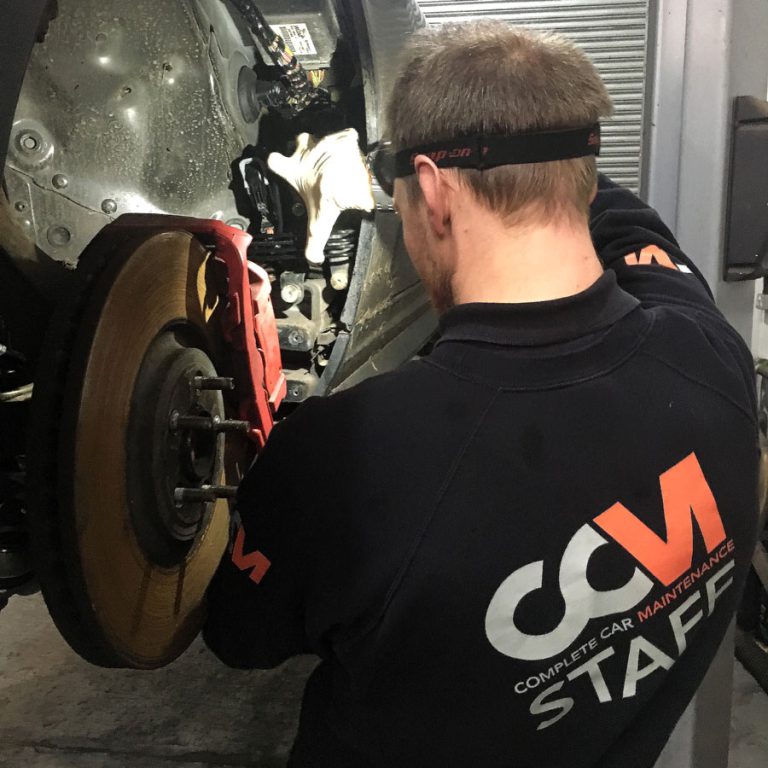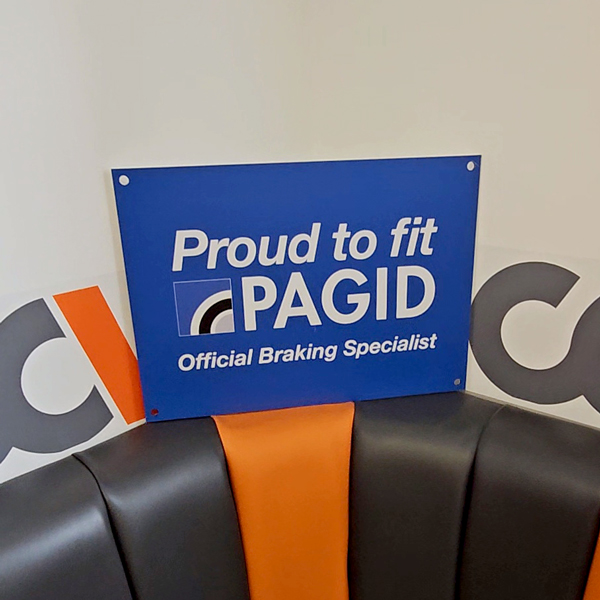- Soft or squidgy feeling brakes
- Strange noises when braking
- Thudding or vibration felt when braking
- ABS wrongly engaging
- Car pulling to one side when braking
Soft and squidgy feeling brakes
Spongy, squidgy or mushy brakes are just some of the terms we hear. This can be caused by a few different things.
– Air in the brake line or a damaged line can cause this as the braking system needs the hydraulic pressure to be evenly distributed.
– Old contaminated brake fluid or a lack of it could also be a cause. The brake fluid transforms the force you press on the pedal into the force to bring the car to a halt. If this is contaminated, or there isn’t enough left then you will have trouble with your brakes.
– Damaged cylinders can leak braking fluid so if you have to push your brake right to the floor, it could be because the fluid isn’t able to fully circulate the cylinders.
– Your brake calipers have to endure an incredible amount of heat that is generated when braking. This can lead to squishy brakes as well as your car pulling to one side and a high pitched squealing when braking.
Excessive noise when braking
In general, your brakes making any sort of noise are a warning that something isn’t quite right. Whether it’s grinding, thudding or squeaky brakes, none are good news!
– Usually, customers report a grinding noise (metal rubbing on metal) which can be caused by thin brake pads. If you imagine that each time you brake, a thin slice of metal is worn off your pads then you can start to understand why brake pads wear over time. A brake pad replacement is routine for us so it’s really quick and easy to do.
– The weather can increase brake noises and cold temperatures are known to make them noisy, especially if it has been raining and your pads are wet. This can cause a layer of rust to form on the brake pads but don’t worry, as soon as you start driving and braking again, the thin rust will be removed.
– If you are often driving with a car full of people or heavy loads then this will put more stress on your brakes. The heavier the load, the more effort it will take for the vehicle to stop. This isn’t an issue to worry about straight away but if you often drive with a car full you really should be getting your brakes checked more often than most.
– Sometimes, you get bits of grit, dirt and small stones stuck in between the caliper and pad. As the brakes are applied the stone is squished onto the pad and can cause noise. Just like your eyes when an eyelash falls in, the brakes will push out the stone so the noise shouldn’t last for long.
Thudding or vibration felt when braking
It’s a common issue to feel vibration through the steering wheel when braking and it’s often referred to as brake shudder. It’s usually an issue with the brake discs.
– It could be due to unevenly worn or DTV (disc thickness variation). When your brakes are applied, the two places of contact should be flat and even surfaces. If they aren’t then you are likely to feel the shudder coming through. This could be due to the calipers not working as expected, the rotors not being installed properly or the bedding in process not being done properly if new pads have been fitted
– A build-up of uneven rust can appear on the hub face over time which means that you don’t have an even surface for the discs to be mounted onto. You can easily remove the rust with some sandpaper and a bit of WD40

.
Faulty ABS (Anti-Lock Brake System)
If your ABS is kicking in without it needing to, its an issue that needs to be looked into. ABS should only activate when the system notices a pause or slowdown in wheel rotation. It then kicks in to ‘pulse’ the brakes on and off to reduce the risk and improve the control of a skid.
– The most common issue is due to the sensors becoming contaminated. This can either be from brake fluid, metal shavings or general debris.
Car pulling to one side when braking
As if your brakes failing wasn’t scary enough, it can also affect your steering and pull you over to one side.
– This is usually down to one brake pad sticking or dragging on one side which can then pull you over to that side
– It could also be an issue with your wheel cylinder or even a hydraulic fault. If your brakes are locking this will cause unnecessary friction which will cause your brakes to get extremely hot. You may then start to notice a nasty burning smell as well.
– The brake hose could be clogged which is stopping the brake fluid moving freely so your brakes can’t properly activate.
Each of these issues are worth bringing your car in for review. The more information you can provide us about the problems you are having, the easier it is for us to diagnose. Most brake issues can be repaired within a couple of hours on the same day.
When Should I Get My Brakes Checked?
A good rule of thumb is to have your brakes looked over at least every six months. When you have your MOT, the tester will inspect your brakes and let you know if your pads are wearing thin. They can then usually let you know roughly how long you have left on your pads and estimate when they will need replacing.
You should also be prepared to have a brake fluid service every two years. If you have contaminated or not enough brake fluid, your brakes won’t be able to function. It’s as simple as that. We carry out a brake fluid test and report in each of our service levels, and a brake fluid change is included in the platinum service.

Book your brake repairs here
New brake pads fitted whilst I waited. Everything was as planned and the job was done on time and at cost quoted.
Recently had work done on my brakes - as usual Service with a capital 'S' which is worth so much these days. Car checked and returned gleaming, perfect!
Wonderful front of house so professional and helpful! Service team so professional! I live quite away from CCM but always go back as I totally trust in their work.
We've been using these guys for 8 years now and they're solid. I transferred to them from another garage after being dissatisfied with their service and I have been very happy with the switch. No hassle, excellent service - great people to work with.
I always find CCM to be helpful, knowledgable and friendly. They come back quickly with information required and try to get the best price. I would recommend. Tim and Sharon in the office are efficient and always cheerful! Thank you
The company have given me a good reliable service since it started and have always completed the work in a very satisfactory manner. The staff are always very polite and have put themselves out to keep me 'on the road' at all times. I wouldn't go anywhere else to get my car serviced, as in my opinion, they are second to none.
CCM undertook a comprehensive health check and brake repair of a family vehicle - rectifying the shortcomings of the Guildford trader. I cannot thank the CCM team enough for its timely, efficient and courteous attention to a new customer; plus outstanding and value for money service. I would recommend this garage highly. CCM has redeemed my confidence in independent garage services.
I needed my new front brake discs skimmed as BMW were not helpful at all. CCM was the only company for miles around that would happily take on the job. Needless to say, the brakes now feel brand new again. Oh, and a free courtesy car for the day is a massive help. I will definitely use CCM again in the future.


